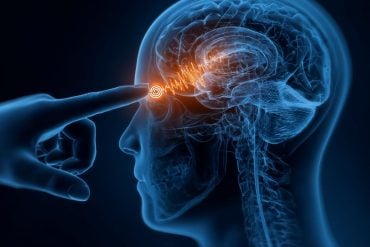Summary: A recent clinical trial found that ibudilast, a drug once promising for alcohol use disorder, was no more effective than a placebo overall. While all participants reduced their drinking, women on ibudilast showed a greater drop in drinks per day, hinting at a gender-specific benefit.
Those with higher levels of depression responded better to placebo, suggesting mood and inflammation may influence treatment outcomes. The results support further investigation into immune-based treatments tailored to individual traits.
Key Facts:
- Mixed Results: Ibudilast didn’t reduce drinking more than placebo overall.
- Gender-Specific Effects: Women improved more on ibudilast, while people with depression fared better on placebo.
- Placebo Power: Both groups showed substantial improvement, complicating efficacy evaluation.
Source: UCLA
A drug that once showed promise as a treatment for alcohol use disorder did not work as expected, a new UCLA clinical trial found.
The drug, ibudilast, is approved for the treatment of asthma and post-stroke dizziness in Japan, and previous research suggested it might also help people reduce their drinking.
The findings, published in the journal JAMA Network Open, showed that ibudilast works no better than a placebo for most people, although it did have a positive effect for one group of study participants.

“While ibudilast was not superior to the placebo, we saw that some individuals did better and some did worse with the drug,” said UCLA psychology professor and the study’s first author, Lara Ray.
“Female study participants did better, but both men and women who came in with higher levels of depression did worse, which are results we can use to guide further research.”
The findings are the culmination of many years of investigation into ibudilast by Ray’s research group, the UCLA Addictions Lab. Although the drug did not turn out to be as effective as they had hoped, the mixed results nonetheless point toward the roles that inflammation and the immune system may play in alcoholism.
Like apremilast, another drug undergoing testing as a potential alcoholism treatment, ibudilast targets immune responses and related inflammation.
“We think that there’s a strong immune contribution to psychiatric disorders, especially depression and alcohol use disorder,” said Ray.
“Women generally have higher inflammation levels, and the fact that ibudilast works better for them and worse for people with more depressive symptoms suggests that we may be on the right track. Immune treatments have revolutionized cancer treatment, and we’re using this novel approach to do that for alcohol use disorder.”
For the study, the researchers recruited 102 adults who were seeking treatment for moderate or severe alcohol use disorder to take either ibudilast or a placebo twice daily for 12 weeks and followed up with them for four weeks after the treatment period ended.
They tracked the percentage of heavy drinking days, the number of drinks per drinking day, and the percentage of days abstinent. Depressive symptoms and inflammation were also tracked.
“What we found is that there were general reductions in drinking across both the ibudilast and the placebo groups,” said Ray.
On average, participants started with seven drinks per drinking day, and by the end of treatment, they had reduced that to around three to four drinks per drinking day, on average.
However, this reduction was seen in the placebo group and the ibudilast group, which means that the researchers couldn’t establish that ibudilast was superior to the placebo in reducing drinking.
“One of the challenges in alcohol use disorder trials is that all participants usually improve their drinking across the board.
“Participants are responding to the whole treatment setting, and regardless of medication, we see a very pronounced beneficial effect on alcohol use disorder. So it can be hard to tease apart the placebo effect from the medication,” said Ray.
Women who took ibudilast, however, drank fewer drinks per drinking day. The effect was strong enough that the researchers concluded that further studies testing the efficacy of ibudilast in reducing drinking for women are worthwhile.
On the other hand, people who started the study with more depressive symptoms both drank fewer drinks per day and had more abstinent days while taking the placebo. Ibudilast also did not reduce markers of inflammation.
“Our lab is uncovering novel treatments for substance use disorders, and we’re excited that all the people who came into our study improved,” said Ray.
“One of the challenges going forward is to follow people a little bit longer, say, in a six-month trial, so that we can get more of a separation between the treatment context and the active medication effect.”
“Ongoing analyses of this clinical trial will help us elucidate who responds to this medication for alcohol use disorder, such as individuals reporting co-occurring pain and those with higher levels of inflammation to begin with.”
This trial was funded by the National Institute on Alcohol Abuse and Alcoholism, and the UCLA Addiction Lab’s ongoing trials will require a continued funding commitment from the federal government to develop effective new treatments for a problem that affects nearly 30 million adults in the United States alone.
“People are coming to our lab because they trust UCLA,” said Ray. “They’re reporting on their drinking regularly, and that, in and of itself, is causing pretty significant changes in their behavior.”
About this psychopharmacology and AUD research news
Author: Holly Ober
Source: UCLA
Contact: Holly Ober – UCLA
Image: The image is credited to Neuroscience News
Original Research: Open access.
“A Neuroimmune Modulator for Alcohol Use Disorder” by Lara Ray et al. JAMA Network Open
Abstract
A Neuroimmune Modulator for Alcohol Use Disorder
Importance
The neuroimmune system represents a promising target for novel medications for alcohol use disorder (AUD). Ibudilast is a neuroimmune modulator which selectively inhibits phosphodiesterases (PDE) 3, PDE4, PDE10, and PDE11, and macrophage migration inhibitory factor (MIF).
Objective
To test the efficacy of ibudilast for AUD compared with placebo.
Design, Setting, and Participants
This randomized clinical trial was a double-masked, phase 2 trial conducted at an academic research center between October 2018 and April 2023. Eligible participants were adults seeking treatment for moderate or severe AUD. After completing the 12-week treatment period, participants were followed up for an additional 4 weeks.
Interventions
Ibudilast taken twice daily in 50 mg doses for 12 weeks vs placebo.
Main Outcomes and Measures
Percentage of heavy drinking days; secondary efficacy outcomes included drinks per day, drinks per drinking day, and percentage of days abstinent. Registered exploratory analyses tested whether the effects of ibudilast of drinking outcomes were moderated by baseline depressive symptomatology.
Registered exploratory analyses also tested whether ibudilast reduced inflammation compared with placebo, as indicated by circulating levels of proinflammatory markers over the 12-week trial. Additionally, a post hoc exploratory analysis investigated whether sex moderated the effect of ibudilast on drinking outcomes. Data were analyzed between October 2018 and April 2023.
Results
A total of 102 participants were enrolled in the study (mean [SD] age, 44.3 [10.8] years; 61 male [59.8%]; 24 Black [23.5%], 32 Hispanic [31.4%], 52 White [51.0%]). Baseline demographic characteristics and alcohol use patterns did not significantly differ between the 2 medication conditions.
There was no significant difference between ibudilast vs placebo on percentage of heavy drinking days (β = 0.06, SE = 0.08 [95% CI, −0.09 to 0.21]; P = .46). There were no significant differences between ibudilast vs placebo on registered secondary outcomes. There were no significant effects of ibudilast compared with placebo on peripheral markers of inflammation.
Moderation analyses found that baseline depressive symptomology (time 2 for drinks per drinking day: β = 0.25, SE = 0.11 [95% CI, 0.03 to 0.48]; P = .03) and sex (β = −2.48, SE = 1.07 [95% CI, −4.59 to −0.37]; P = .02) may moderate the effects of ibudilast.
Conclusions and Relevance
In this randomized clinical trial of ibudilast for the treatment of AUD, there was no support for the efficacy of ibudilast over placebo; additionally, no effect of ibudilast on markers of peripheral inflammation was observed. As novel treatments for AUD are developed for novel molecular targets, their effects may depend on mechanisms and moderators of efficacy.
Trial Registration
ClinicalTrials.gov Identifier: NCT03594435






